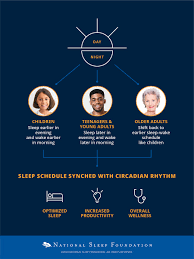The circadian rhythm is a natural, internal process that regulates the sleep-wake cycle of our body. It is a 24-hour cycle that governs the biological processes of living organisms, including humans. The circadian rhythm is influenced by various factors such as light exposure, temperature, and meal times.
The most important factor in regulating the circadian rhythm is light exposure. Exposure to light during the day helps to keep the body’s clock in sync with the external environment. The eyes send signals to the brain about the amount and timing of light exposure, which in turn affects hormone production and other physiological processes.
The circadian rhythm also plays a crucial role in regulating our sleep patterns. Our bodies naturally produce melatonin, a hormone that promotes sleepiness, at night when it’s dark. As daylight approaches, melatonin production decreases, and cortisol production increases, signaling our bodies to wake up and start our day.
Disruptions to our circadian rhythm can have significant impacts on our health and well-being. Shift work or jet lag can disrupt our natural sleep-wake cycle by exposing us to light at unusual times or disrupting meal times. This can lead to feelings of fatigue, difficulty sleeping, mood swings, and decreased cognitive function.
There are several ways we can regulate our circadian rhythm and improve our sleep patterns. One way is to maintain consistent bedtimes and wake-up times even on weekends or days off work. This helps to reinforce our body’s natural clock and promote better sleep quality.
Another way is to limit exposure to bright lights before bedtime. This includes avoiding electronic screens such as smartphones or tablets for at least an hour before bed as they emit blue light which suppresses melatonin production.
Finally, regular exercise during daylight hours can help regulate the circadian rhythm by promoting healthy hormone production and improving overall physical health.
In conclusion, understanding the importance of the circadian rhythm in regulating our sleep patterns and overall health is crucial. By adopting healthy habits such as maintaining a consistent sleep schedule, limiting exposure to bright lights before bedtime, and regular exercise, we can promote better sleep quality and improve our overall well-being.
7 Tips for Optimizing Your Circadian Rhythm
- Maintain a consistent sleep schedule
- Get natural sunlight exposure
- Reduce stress levels
- Limit caffeine intake
- Exercise regularly
- Avoid blue light before bedtime
- Create a relaxing nighttime routine
Maintain a consistent sleep schedule
Maintaining a consistent sleep schedule is one of the most effective ways to regulate our circadian rhythm and improve our overall sleep quality. Our bodies naturally crave routine, and keeping a consistent bedtime and wake-up time can help reinforce our body’s natural clock.
When we go to bed and wake up at the same time every day, our body learns when it’s time to sleep and when it’s time to wake up. This helps us fall asleep faster, stay asleep longer, and wake up feeling more refreshed.
Inconsistent sleep patterns can disrupt our circadian rhythm, leading to feelings of fatigue, difficulty sleeping, mood swings, and decreased cognitive function. This is especially true on weekends or days off work when we may be tempted to stay up late or sleep in.
To maintain a consistent sleep schedule, it’s important to establish a routine that works for you. Choose a bedtime that allows you to get at least 7-8 hours of sleep each night and stick to it as closely as possible. Similarly, choose a wake-up time that allows you to get up at the same time every day.
It’s also important to avoid napping during the day as this can disrupt your natural sleep pattern. If you do need a nap, limit it to 20-30 minutes in the early afternoon.
By maintaining a consistent sleep schedule, we can regulate our circadian rhythm and improve our overall health and well-being. So why not try establishing a routine today? You may be surprised at how much better you feel!
Get natural sunlight exposure
Getting natural sunlight exposure is an essential tip for regulating our circadian rhythm and improving our sleep patterns. Exposure to bright light during the day helps to keep our body’s clock in sync with the external environment, promoting better sleep quality at night.
Sunlight exposure also has other health benefits, such as improving mood and increasing Vitamin D production. Vitamin D is crucial for maintaining healthy bones, muscles, and immune function.
However, many people spend most of their time indoors, especially during the winter months when daylight hours are shorter. This can lead to a lack of natural sunlight exposure and a disruption of our circadian rhythm.
To get more natural sunlight exposure, try taking a walk outside during your lunch break or opening your curtains to let in more natural light. If you work from home or spend most of your time indoors, consider investing in a light therapy lamp that simulates natural sunlight.
In conclusion, getting natural sunlight exposure is an easy and effective way to regulate our circadian rhythm and improve our overall health. By making small changes to our daily routine such as taking a walk outside or using a light therapy lamp, we can promote better sleep quality and increase our overall well-being.
Reduce stress levels
Stress is one of the biggest disruptors of our circadian rhythm. When we are stressed, our bodies produce cortisol, a hormone that promotes wakefulness and alertness. While this can be helpful during the day, it can interfere with our ability to fall asleep at night.
Chronic stress can also lead to other health problems such as anxiety, depression, and high blood pressure. All of these conditions can further disrupt our sleep patterns and exacerbate the negative effects of stress on our circadian rhythm.
Reducing stress levels is crucial for promoting healthy sleep patterns and maintaining a consistent circadian rhythm. There are several strategies we can use to reduce stress levels, including:
- Exercise: Regular exercise is an effective way to reduce stress levels by releasing endorphins, which promote feelings of happiness and relaxation.
- Mindfulness meditation: Mindfulness meditation involves focusing on the present moment without judgment or distraction. This practice has been shown to reduce stress levels and improve sleep quality.
- Breathing exercises: Deep breathing exercises such as diaphragmatic breathing or box breathing can help reduce stress levels by promoting relaxation and reducing tension in the body.
- Time management: Poor time management can lead to feelings of overwhelm and stress. By prioritizing tasks and setting achievable goals, we can reduce stress levels and promote better sleep quality.
In conclusion, reducing stress levels is crucial for maintaining a healthy circadian rhythm and promoting better sleep quality. By adopting healthy habits such as regular exercise, mindfulness meditation, breathing exercises, and effective time management strategies, we can improve our overall well-being and achieve better sleep patterns.
Limit caffeine intake
Limiting caffeine intake is an essential tip for regulating our circadian rhythm and improving our sleep patterns. Caffeine is a stimulant that can interfere with the natural production of melatonin, the hormone that promotes sleepiness.
Caffeine can stay in our system for several hours, and consuming it too close to bedtime can make it difficult to fall asleep and stay asleep. This can lead to feelings of fatigue, irritability, and decreased cognitive function the next day.
To promote better sleep quality, it’s best to avoid caffeine altogether or limit its consumption to earlier in the day. The amount of caffeine that affects each person varies, but as a general rule, it’s best to avoid consuming caffeine at least six hours before bedtime.
Some common sources of caffeine include coffee, tea, energy drinks, soda, and chocolate. It’s essential to read labels carefully and be aware of hidden sources of caffeine in foods such as ice cream or pain relievers.
In conclusion, limiting caffeine intake is an effective way to regulate our circadian rhythm and promote better sleep quality. By being mindful of our consumption habits and avoiding or limiting caffeine later in the day, we can improve our overall well-being and feel more rested and alert during the day.
Exercise regularly
Exercise is a great way to promote a healthy circadian rhythm and improve sleep quality. Regular physical activity during the day helps to regulate hormone production, including cortisol, which plays a crucial role in our sleep-wake cycle.
Studies have shown that people who exercise regularly tend to fall asleep faster and experience deeper, more restorative sleep. This is because exercise helps to reduce stress and anxiety levels, which can interfere with our ability to fall asleep and stay asleep.
However, it’s important to note that timing matters when it comes to exercise and sleep. Intense exercise too close to bedtime can actually have the opposite effect and make it harder to fall asleep. This is because exercise increases heart rate and body temperature, both of which can interfere with the body’s natural cooling process that occurs during sleep.
To maximize the benefits of exercise on our circadian rhythm, it’s best to aim for moderate-intensity workouts during daylight hours. A morning workout can help kickstart our metabolism for the day ahead while an afternoon workout can help us de-stress after a long workday.
In conclusion, regular exercise is an excellent way to promote a healthy circadian rhythm and improve sleep quality. By incorporating moderate-intensity workouts into our daily routine during daylight hours, we can reap the benefits of better physical health and more restful sleep at night.
Avoid blue light before bedtime
One of the most effective ways to improve your sleep quality and regulate your circadian rhythm is to avoid blue light exposure before bedtime. Blue light is emitted by electronic devices such as smartphones, tablets, and computers, and it can suppress the production of melatonin – the hormone that regulates our sleep-wake cycle.
Studies have shown that exposure to blue light before bedtime can make it harder to fall asleep and reduce overall sleep quality. This is because blue light can trick our brains into thinking it’s daytime, making us feel more alert and awake.
To avoid the negative effects of blue light on our sleep patterns, it’s essential to limit our exposure to electronic screens at least an hour before bedtime. This may involve setting a regular “digital curfew” for yourself or using apps or software that filter out blue light from your devices.
Instead of staring at a screen before bed, try engaging in relaxing activities such as reading a book, taking a warm bath, or practicing meditation. These activities can help you unwind and prepare your mind and body for restful sleep.
By avoiding blue light exposure before bedtime, you can promote better sleep quality and regulate your circadian rhythm. Incorporating this simple tip into your nightly routine can lead to significant improvements in your overall health and well-being.
Create a relaxing nighttime routine
Creating a relaxing nighttime routine can be a great way to regulate your circadian rhythm and promote better sleep quality. Our bodies naturally produce melatonin, a hormone that promotes sleepiness, at night when it’s dark. By creating a relaxing nighttime routine, we can help our bodies wind down and prepare for sleep.
Here are some tips to create a relaxing nighttime routine:
- Set a consistent bedtime: Try to go to bed at the same time every night, even on weekends or days off work. This helps to reinforce your body’s natural clock and promote better sleep quality.
- Disconnect from electronics: Avoid using electronic devices such as smartphones or tablets for at least an hour before bed as they emit blue light which suppresses melatonin production.
- Take a warm bath or shower: A warm bath or shower can help relax your body and prepare it for sleep.
- Practice relaxation techniques: Try deep breathing exercises, meditation, or yoga to help calm your mind and reduce stress.
- Read a book: Reading a book can be a great way to unwind before bed and promote relaxation.
By incorporating these tips into your nighttime routine, you can help regulate your circadian rhythm and promote better sleep quality. Remember that consistency is key when it comes to regulating your body’s internal clock, so try to stick with your routine as much as possible for the best results.




